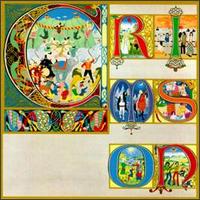| King Crimson - Lizard (1970) |
| Cover Front | Album | ||||||||||||

|
|
| Track List | |||||
| 01 | Cirkus including Entry of the Chameleons | 06:29 | |||
| 02 | Indoor Games | 05:40 | |||
| 03 | Happy Family | 04:24 | |||
| 04 | Lady Of The Dancing Water | 02:44 | |||
| 05 | Lizard (a) Prince Rupert Awakes (b) Bolero - The Peacock's Tale (c) The Battle Of Glass Tears (i) Dawn Song (ii) Last Skirmish (iii) Prince Rupert's Lament (d) Big Top | 23:23 | |||
|
|
||||||||||||||||
| Notes |
| Year: 1970 Personnel: Robert Fripp Guitar, Mellotron, Electric Keyboards and Devices Mel Collins Flute and Saxes Gordon Haskell Bass Guitar and Vocals Andy McCulloh Drums Peter Sinfield Words and Pictures with Robin Miller Oboe and Cor Anglais Mark Charig Cornet Nick Evans Trombone Keith Tippet Piano and Electric Piano Jon Anderson of YES Vocals on "Prince Rupert Awakes" The first side of Lizard is not what I would call the best Crimson, don't get me wrong, it's very good, but compared to what KC can do, it falls a bit short. First off, I'm not a big fan of Gordon Haskells voice and Robert's guitar isn't that great either. The second side is a completely different story. The song Lizard is beautifuly orchestrated, Jon Anderson's vocals On "Prince Rupert Awakes" is breath taking. Even Haskell's vocals are beautiful on "Prince Rupert's Lament". I also really like the cover art, if you look you can see that the images are taken from the songs I think it's a very good concept for a cover. AMG EXPERT REVIEW: This was to have been King Crimson's comeback album though it could be argued that any band whose first two LPs had made the upper reaches of the British charts and sold well in America hardly needed a "comeback." The group, however, had disintegrated twice in the wake of their first two LPs, and Lizard was intended to introduce the new lineup of the band as a full-fledged, full-time touring ensemble. It didn't work out that way, as vocalist/bassist Gordon Haskell walked out in early November 1970, during the final stages of recording the album. So Lizard ended up showing up in stores as a stand-alone entity, with no singer in the band and, as drummer Andy McCullough had also left, no band at all to tour behind the album. Lizard is very consciously jazz-oriented the influence of Miles Davis (particularly Sketches of Spain) being especially prominent and very progressive, even compared with the two preceding albums. The pieces are longer and have extensive developmental sections, reminiscent of classical music, and the lyrics are more ornate, while the subject matter is more exotic and rarified epic, Ragnarok-like battles between good and evil that run cyclically. The doom-laden mood of the first two albums is just as strong, except that the music is prettier; the only thing missing is a sense of humor. Jon Anderson of Yes guests on one key number, "Prince Rupert Awakes" (which Haskell never completed), and the album is stronger for his presence. At the time of its release, some critics praised Lizard for finally breaking with the formula and structure that shaped the two preceding albums, but overall it's an acquired taste. The 24-bit remastering on the 1999 Virgin reissue, which comes complete with a booklet giving a history of the recording and release of the album, extracts details in the instrumentation that were muted on previous CD and LP editions; these include the much clearer presence of the VCS-3 synthesizer, Marc Charig's cornet, and Robin Miller's oboe and English horn. Bruce Eder |